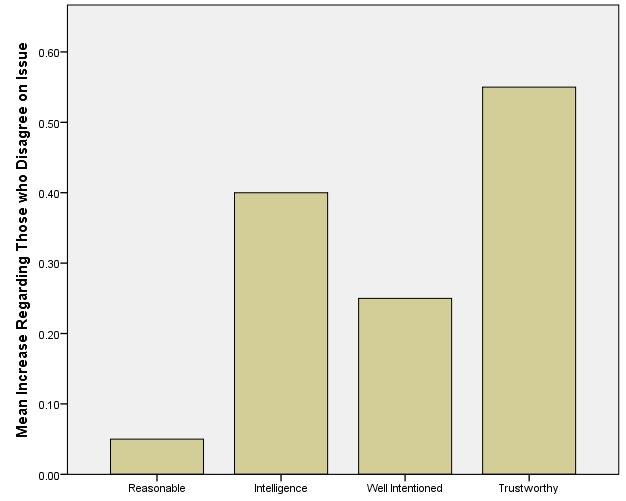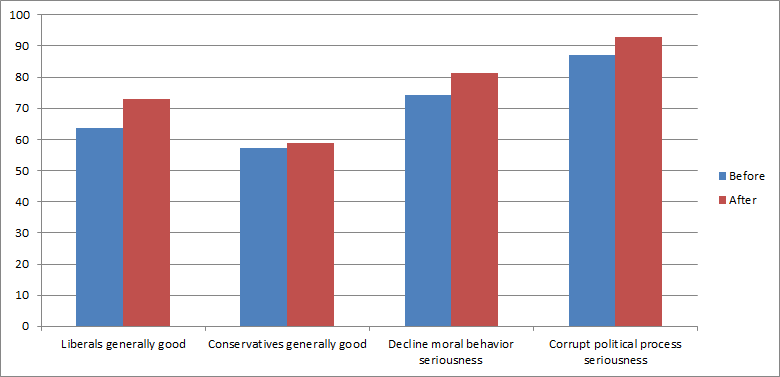How Dialogue and Listening lead to Common Ground from Project Citizen’s Suzanne Soule
CivilPolitics’ mission is to educate the public on evidence-based methods for improving inter-group dialogue, with evidence defined broadly to include academic studies, empirical studies of community interventions, and also the practical wisdom learned by organizations that are bringing people together in the community. As part of this last area of evidence, we are asking our partners in the community to answer a set of semi-standardized questions designed to help us learn the common themes that run through successful community work. If you would like to have your organizations’ work profiled, please do contact us and/or fill out this form. This is the third post in the series detailing the experiences of Suzanne Soule, who worked as the Director of Research for the Center for Civic Education for over a decade.
What is the organization/group that you worked with? What is its history in terms of getting involved with improving community relationships?
I worked as director of research for the Center for Civic Education for a little over a decade. We worked with youth in the United States and Emerging Democracies to try to get them to be engaged citizens, through programs like We the People and Project Citizen.
What specific programs/events/curriculum do you run? Briefly describe what it is you do.
Most of the students in these countries did a program called Project Citizen. Despite all the talk about uncivil discourse in the US, we are a lot further along than these emerging democracies. We at least have a forum and a conversation, whereas in a lot of these places, there is no forum and people may just walk out of the room, when confronted with conflicting opinions. Most of the best lessons for resolving inter-group divisions could be learned from our work with post-war emerging democracies. We did research in Boznia/Herzegovina, Palestine, and other emerging democracies that had a history of totalitarianism that had issues with transparency and corruption. In these places, there is not a history of open dialogue, so there was a lot to be learned in creating such a space.
Young people would conduct research on a problem in their community that they chose and propose a solution based on their research to elected officials. In a place like China, they may also go to the media and increase pressure on officials. We partnered with local organizations as there is a lot more autonomy at the local level for change, within emerging democracies as well as places like China. This wouldn’t have worked without the local partners as you can’t do these things from the outside.
Students vote on which problem they should address. There would be winners and losers and some students would end up on a project that they didn’t necessarily care about. The teachers worked to give them a reasonable role in the project as there is often a difficult moment where their chosen issue has lost, but in all the years I worked on Project Citizen, I’ve never noticed a time when a student wasn’t able to eventually contribute. The contribution may end up large or small, but they all end up contributing something, even if it isn’t exactly the issue they would have chosen, which has implications for getting people to work together on collective action from different perspectives.
What has worked well in your programs/events? If someone else wanted to replicate your programs, what specific advice would you give them as far as things to do to replicate your successes?
What I think works well in getting a student to work towards a group goal that they didn’t initially endorse is to figure out what a students’ skills are and seeing how that relates to the problem. If they are good artists or good interviewers, how can we help them shine so that they can do really good work leveraging those skills and buy in.
They also work together in groups, so seeing the others inspired in the group works wonders. Over time, their initial ideas about the ideal project fade and the group project gains momentum.
In conversations with adults, it also helped that the students did a lot of research, so the adults were often convinced by the students because of their empirical knowledge. Students were trained to evaluate the status kuo and were often critical of existing policies. and able to effect change because they had lots of evidence. Public officials who would be threatened by adults making the same recommendations were far more open to a group of 12 year olds. They were much more open. They often got a lot more of what they wanted from the public officials than we thought was possible. Youth often melts the hearts of hardened people…the heart opens and there is an element of surrender.
What have you tried in your progams/events that has NOT worked well? If someone else wanted to replicate your programs, what advice would you give them as far as things to AVOID doing?
It doesn’t work if the problem is chosen from the outside. There needs to be some time spent on finding out what they care about themselves with a lot of listening and open dialogue. I had to stop going in with a questionnaire and just listen to what concerned them and what was really problematic. Often they would come back to the problems I listed, but there was more buy-in if they came up with it themselves. There was more discourse and willingness to do the work as they were invested rather than thinking that there were these “Americans” coming in telling them what to do.
As far as the public officials we talked to, if there was any possibility that the officials would be shamed or put on the spot, then it would close dialogue. But if there were a possibility for positive PR or an award…or to talk to their own constituents/voters, people were very open. Having people far removed from them telling what to do would also close things down.
Among the ideas listed on CivilPolitics’ website, based on psychological research, that have been suggested as ways to reduce intergroup divisions. Which of these ideas are reflected in the work you do? What might you add to these ideas?
Providing Information on Common Goals/Threats, Reducing the Perception of “Zero-Sum” competition, (any win for one side = a loss for the other side), Showing Examples of Positive Relationships , Reducing the Perceived Differences Between Groups, Showing Examples of Cross-Group, Unexpected Agreement or Disagreement , Reducing Certainty of Individual Beliefs, Increasing Cross-Group Personal Connections through Fun, Meals, Talking, etc..
I would like to emphasize listening at the outset. Careful listening that leads to finding common ground. It gives space for people to realize that they often have the same problems in divided societies and it improves relationships for people to realize that people unlike them have the same issues. It humanizes the other side.
Where can others learn more about what you do?


